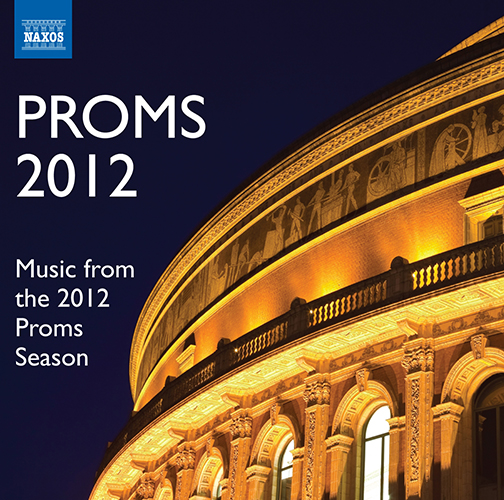Proms 2012 - Music from the 2012 Proms Season
Various Artists and Orchestras (please see Album Info)
Naxos 2012
![]()
![]()
![]()
Proms 2012 - Music from the 2012 Proms Season
Artists and Orchestras:
Mireille Delunsch (soprano), Helene Jossoud (mezzo-soprano), Gerard Theruel (baritone), Manfred Fink (tenor), Ruxandra Donose (mezzo-soprano), Hasmik Papian (soprano), Claudio Otelli (bass-baritone), Simon Lindley (organ), Christopher Purves (baritone), John Cheek (bass), Claire Rutter (soprano), James Gilchrist (tenor), Chen-Ye Yuan (baritone), Thomas Hammons (bass-baritone), Robert Orth (baritone)
Polish National Radio Symphony Orchestra, Lille National Orchestra, Capella Istropolitana, Nicolaus Esterhazy Sinfonia, Nicolaus Esterhazy Chorus, San Diego Symphony Orchestra, Lyon National Orchestra, New Zealand Symphony Orchestra, Leeds Philharmonic Ch, Adrian Leaper, Jean-Claude Casadesus, Bohdan Warchal, Bela Drahos, Yoav Talmi, Jun Markl, James Judd, Paul Daniel, Michael Tippett, Marin Alsop, Kees Bakels, Vasily Petrenko, David Hill, Michael Halasz
Tracklisting
Edward Elgar: Cockaigne, Op. 40, “In London Town”
Cockaigne, Op. 40, “In London Town”
Claude Debussy: Pelleas et Melisande (Pelleas and Melisande)
Pelleas et Melisande (Pelleas and Melisande), Act I: Il fait sombre dans les jardins
George Frideric Handel: Water Music: Suite No. 2 in D Major, HWV 349
Water Music: Suite No. 2 in D Major, HWV 349: II. Alla Hornpipe
Ludwig van Beethoven: Symphony No. 3 in E-Flat Major, Op. 55, “Eroica”
Symphony No. 3 in E-Flat Major, Op. 55, “Eroica”: I. Allegro con brio
Ludwig van Beethoven: Symphony No. 5 in C Minor, Op. 67
Symphony No. 5 in C Minor, Op. 67: I. Allegro con brio
Ludwig van Beethoven: Symphony No. 6 in F Major, Op. 68, “Pastoral”
Symphony No. 6 in F Major, Op. 68, “Pastoral”: I. Pleasant, cheerful feelings aroused on approaching the countryside: Allegro ma non troppo
Ludwig van Beethoven: Symphony No. 7 in A Major, Op. 92
Symphony No. 7 in A Major, Op. 92: II. Allegretto
Ludwig van Beethoven: Symphony No. 8 in F Major, Op. 93
Symphony No. 8 in F Major, Op. 93: I. Allegro vivace e con brio
Ludwig van Beethoven: Symphony No. 9 in D Minor, Op. 125
Symphony No. 9 in D Minor, Op. 125, ‘Choral’: IV. Finale: Presto
Hector Berlioz: Les Troyens
Les Troyens: Prelude
Claude Debussy: La mer
La mer: No. 1. De l’aube a midi sur la mer
Ralph Vaughan Williams: Fantasia on a Theme by Thomas Tallis
Fantasia on a Theme by Thomas Tallis
William Walton: Belshazzar’s Feast
Belshazzar’s Feast: Praise ye
Michael Tippett: A Child of our Time
A Child of our Time: Part II: A Spiritual of Anger: Go down, Moses
Leonard Bernstein: Mass
Mass: Gospel-Sermon: “God Said”
Antonin Dvorak: Symphony No. 9 in E Minor, Op. 95, B. 178, “From the New World”
Symphony No. 9 in E Minor, Op. 95, “From the New World”: II. Largo
Ralph Vaughan Williams: Symphony No. 5 in D Major
Symphony No. 5 in D Major: II. Scherzo: Presto misterioso
Dmitry Shostakovich: Symphony No. 10 in E Minor, Op. 93
Symphony No. 10 in E Minor, Op. 93: II. Allegro
Herbert Howells: Hymnus Paradisi (Anonymous lyricist)
Hymnus Paradisi: I heard a voice from heaven
Richard Wagner: Lohengrin
Lohengrin, Act I: Prelude
George Gershwin: An American in Paris
An American in Paris
John Adams: Nixon in China
Nixon in China, Act I: News has a kind of mystery
Henry Wood: Fantasia on British Sea Songs (excerpts)
I. The Saucy Arethusa
II. Tom Bowling
III. Jack’s the Lad
IV. Farewell ye Spanish Ladies
V. Home Sweet Home
VI. See the Conquering Hero
VII. Rule Britannia
Edward Elgar: 5 Military Marches, Op. 39, “Pomp and Circumstance”
5 Military Marches, Op. 39, “Pomp and Circumstance”: No. 1 in D Major, “Land of Hope and Glory”
Hubert Parry: Jerusalem
Jerusalem
Reviews
Guardian Review: Prom 54: RLPO/Petrenko
The follies of the past century cast shadows across all three works in Vasily Petrenko’s Prom with his Royal Liverpool Philharmonic Orchestra, from Delius’s violin concerto, written during the first world war (though you would hardly guess it), through Shostakovich’s 10th Symphony, self-consciously penned in the aftermath of Stalin’s rule, to Sir Peter Maxwell Davies’s Ninth Symphony, partly conceived as a protest against “our disastrous interventions in Iraq and Afghanistan”.
The other unifying feature of the evening was the unfailingly admirable precision and musical discretion of Petrenko’s direction. Amazingly, it is 43 years since the Delius concerto was last heard at the Proms. There are obvious weaknesses in its construction, but Petrenko held the work together with great commitment, and Tasmin Little’s enraptured account of this most improvisatory of works was so eloquent that it blew most doubts away.
Shostakovich’s 10th has its weaknesses, too, but Petrenko’s control and the Liverpool orchestra’s playing made light of them. The great span of the opening movement can be more brooding than Petrenko allowed, but his attention to detail and string balance was gripping at all times, and he drew playing of exceptional beauty throughout – nowhere more so than in the keening woodwind solos that herald the tumult of the finale.
Davies may be Master of the Queen’s Music now, and this Ninth Symphony, premiered by these artists earlier this summer, may be dedicated to the monarch on her jubilee, but there is barely a bar in it that feels celebratory. Played without a break, the symphony unfolds darkly, before a brass sextet, seated above and to one side of the orchestra, introduces a succession of jaunty flourishes. These unleash a series of disintegrations and crises from which the remainder of the work seeks a fragile closure. It may not be Davies’s most characteristic orchestral work, but it is indisputably one of his most engaged and it may well claim a lasting place in the repertoire.
http://www.theguardian.com/music/2012/aug/24/prom-54-rlpo-petrenko-review

